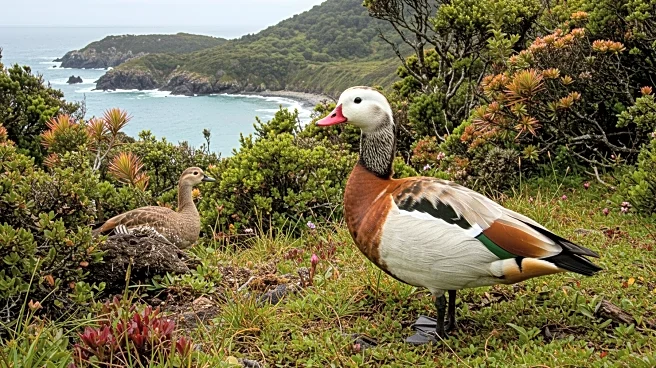What's Happening?
Researchers from the University of Otago have identified a new extinct species of shelduck on the Rēkohu Chatham Islands. The study, led by Associate Professor Nic Rawlence and Dr. Pascale Lubbe, reveals that the shelduck evolved shorter wings and longer legs, indicating a trend towards flightlessness. This adaptation was influenced by environmental factors such as abundant food, lack of predators, and windy conditions, which made flying less necessary. The shelduck, named Tadorna rekohu, is closely related to the pütangitangi paradise shelduck from New Zealand. The species became extinct before the 19th century due to over-hunting and predation. The research, published in the Zoological Journal of the Linnean Society, highlights the Chatham Islands' rich history of waterfowl species prior to human settlement.
Why It's Important?
The discovery of the extinct Rēkohu shelduck provides valuable insights into evolutionary biology and the impact of environmental factors on species development. Understanding how animals adapt to their surroundings can inform conservation efforts and strategies to protect existing species from similar threats. The study also emphasizes the importance of preserving historical biodiversity and the role of indigenous knowledge in scientific research. The collaboration with the Hokotehi Moriori Trust underscores the significance of cultural heritage in scientific discoveries, fostering a deeper connection between the Moriori people and their ancestral lands.
What's Next?
Future research may focus on further exploring the evolutionary pathways of other extinct species on the Chatham Islands, potentially uncovering more about the islands' ecological history. Conservationists and researchers might use this information to develop strategies to protect current species from extinction. Additionally, the collaboration between scientific institutions and indigenous groups could serve as a model for integrating cultural heritage into scientific research, promoting a holistic approach to understanding biodiversity.
Beyond the Headlines
The study highlights the ethical considerations of involving indigenous communities in scientific research, ensuring that their cultural heritage and knowledge are respected and integrated. This approach can lead to more inclusive and comprehensive scientific discoveries, fostering mutual respect and understanding between researchers and indigenous peoples. The findings also raise questions about the long-term impacts of human activity on biodiversity and the importance of sustainable practices to prevent further extinctions.










